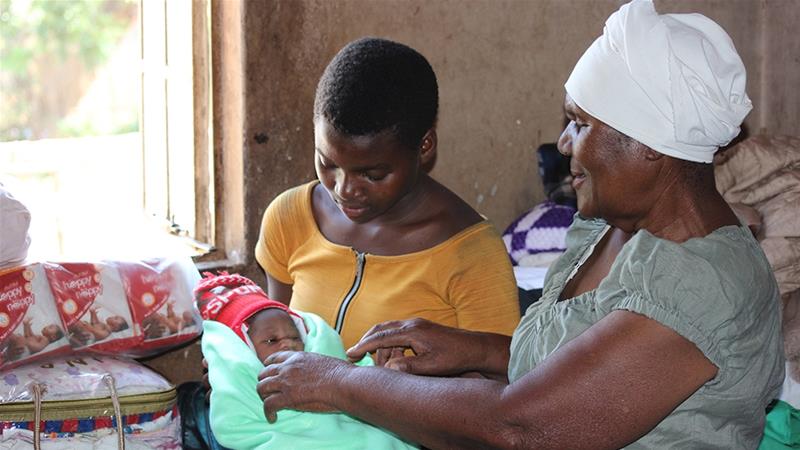New mother Vimbai Mhere gave birth to her daughter in a ‘back yard’ clinic run by midwife Esther Zinyoro [File: Chris Muronzi/Al Jazeera]
Harare, Zimbabwe – Thirty-three-year-old Vimbai Mhere sits on the cement floor of a modest, two-room apartment, sipping tea from a plastic cup and snacking on homemade cakes as she recovers from having just given birth to her fourth child.
“My prayer this morning in the bus was to find someone who could help me deliver my baby,” Mhere tells Al Jazeera.
Never had Mhere imagined she would be scrambling last minute for medical assistance. Early in her pregnancy, she registered to deliver her baby at her local state-funded clinic in Hopley, a poor, densely populated area on the periphery of Harare. But the health facility shut its doors to new patients before her due date.
Mhere’s story has become dangerously common in Zimbabwe, as state-run clinics and hospitals turn away patients or close down while junior doctors and nurses strike for better wages and conditions.
Caught in the crossfire of the standoff between healthcare workers and the government are people in desperate need of medical care, including expectant mothers.
Unable to accommodate her, Mhere’s local clinic referred her to another state-run facility in the Harare suburb of Utsanana.
“Last week, my sister-in-law who was also pregnant went to Utsanana to deliver and was sent away,” she said. “I knew I would not get help delivering my child there.”
Nor could Mhere afford a private hospital. So when her water broke, she and her husband boarded a bus bound for Harare Central Hospital, where she had delivered her other three children.
“Some people on the bus told us not to go to Harare hospital, saying there were no doctors or nurses,” she recalled. “Some said we should go to a home maternity in Mbare.”
By “home maternity”, they meant an unlicensed, informal, back yard facility.
As the pain of Mhere’s contractions intensified, the gravity of her predicament fully dawned on her. Her only option was to have her baby in a back yard clinic.
Worthless wages
Medical staff at Zimbabwe’s state-run facilities have seen their wages decimated by hyperinflation that has roiled the country’s economy this year.
Depleted state coffers have also left the government unable to purchase sufficient supplies for state medical facilities. Power shortages and rolling blackouts have only added to the myriad difficulties facing healthcare providers.
A junior doctor only earns about 400 Zimbabwean dollars ($20 at black market rates) as a basic salary and an “on-call allowance” of approximately 1,000 Zimbabwean dollars ($50) a month.
Practitioners want their salaries indexed against the United States dollar, to keep pace with inflation as the Zimbabwean dollar erodes in value against it.
After negotiations between the government and the union representing junior doctors failed in September, the union called a strike, which is still ongoing.
The doctors defend their labour action on the grounds that they have been incapacitated financially. But the government says the strike is illegal, and it has sacked more than 400 junior doctors and withdrawn salaries from others.
In late October, senior doctors who had assumed emergency-room duties downed stethoscopes around the country in solidarity with their junior colleagues.
With state hospitals and clinics in and around the capital Harare effectively closed for business, patients are now being forced to travel to Karanda Mission Hospital, some 200km (124 miles) north.
Karanda is a 150-bed hospital that was built in 1961 by the Evangelical Church of Zimbabwe. Still run by the church, it is now the last port of call for thousands of Zimbabweans who desperately need medical care.
In a bid to end the health crisis, Zimbabwean telecommunications billionaire Strive Masiyiwa offered to pay the salaries of the country’s 2,000 doctors for three months in the local currency if they resumed their duties. Senior doctors rejected the offer and called on their employer, the Zimbabwean government, to redress their grievances.
The dire state of the country’s healthcare system was captured in a report issued by United Nations independent human rights expert Hilal Elver after she visited the country in late November.
“I received disturbing information that public hospitals have been reaching out to humanitarian organisations after their own food stocks were exhausted and medical equipment no longer operational,” Elver wrote in her observations. “The hospital I visited was nearly empty, because of [the] doctors’ strike.”
Not spared
As was the case with other state medical facilities in Zimbabwe, the strikes did not spare Harare General Hospital.
Knowing this, Mhere – still in active labour – and her husband took the advice of their fellow passengers on the bus and headed to the neighbourhood of Mbare to hunt for a back yard maternity clinic.
“We had no choice,” said Mhere.
After a few enquiries, the couple landed on the doorstep of Esther Zinyoro, an elderly midwife and faith healer who delivered Mhere’s baby girl without complications.
“I praise God today I delivered without any problems,” says Mhere.
Zinyoro, who credits her work to the Holy Spirit, told Al Jazeera she has delivered babies for more than 200 women in her modest two-room apartment since she opened her doors to the public on November 11.
Unassuming and cheerful, wearing a white doek headcloth, the 70-year-old midwife said a request to assist two teenagers who were in labour at the understaffed local clinic in Mbare had convinced her to step into the breach left by striking medical workers.
“They were aged 16 and 17 respectively and were in labour and did not get the help they needed,” she said. “They just didn’t know how to handle the labour pain. There was no one to tell them what to do.”
Zinyoro arrived too late to help the young mothers. Bereft of proper medical attention, both of them lost their children. According to Zinyoro, one baby died because the teenaged mother “had not removed her underwear and the child was choked”.
“I was devastated and I wanted to help,” she said. “I retreated to the wilderness for three days and prayed to God on what to do.”
When she emerged, Zinyoro had made up her mind to open a clinic in her home, free of charge, for pregnant women who have no other viable option to deliver their babies.
On the day Al Jazeera visited, her back yard clinic was a hive of activity.
“I had seven women today,” Zinyoro said. “They all delivered their babies and there is only one woman (Mhere) left,” she says.
But patients cannot stay for long, says Zinyoro. Given how small her apartment is and the number of pregnant women who come to her in need, as soon as women deliver, they have to move on to create space for those in labour.
Zinyoro opened her doors thinking it would be temporary – a stopgap to help her fellow citizens weather the crisis. So when nurses from the local clinic told her to discontinue her work because they had reopened their doors, she started referring pregnant women to the government facility.
“I closed for two days but the women came back saying they were not being attended to at the clinic,” Zinyoro says.
Since then, the midwife has not turned anyone away.
From relative obscurity, her work has now won her national fame. The country’s first lady, Auxilia Mnangagwa, has visited Zinyoro’s apartment and donated food.
The midwife’s work has also won her the enduring gratitude of mothers like Mhere who had nowhere else to turn in their hour of need.
“I am grateful to gogo,” Mhere says, using the Shona word for granny. “I am not sure how and where I would have delivered my baby.”


 Jill Switzer has been an active member of the State Bar of California for over 40 years. She remembers practicing law in a kinder, gentler time. She’s had a diverse legal career, including stints as a deputy district attorney, a solo practice, and several senior in-house gigs. She now mediates full-time, which gives her the opportunity to see dinosaurs, millennials, and those in-between interact — it’s not always civil. You can reach her by email at
Jill Switzer has been an active member of the State Bar of California for over 40 years. She remembers practicing law in a kinder, gentler time. She’s had a diverse legal career, including stints as a deputy district attorney, a solo practice, and several senior in-house gigs. She now mediates full-time, which gives her the opportunity to see dinosaurs, millennials, and those in-between interact — it’s not always civil. You can reach her by email at 





 Ellen Trachman is the Managing Attorney of
Ellen Trachman is the Managing Attorney of 
 Kathryn Rubino is a Senior Editor at Above the Law, and host of
Kathryn Rubino is a Senior Editor at Above the Law, and host of 




 Jordan Rothman is a partner of
Jordan Rothman is a partner of 
